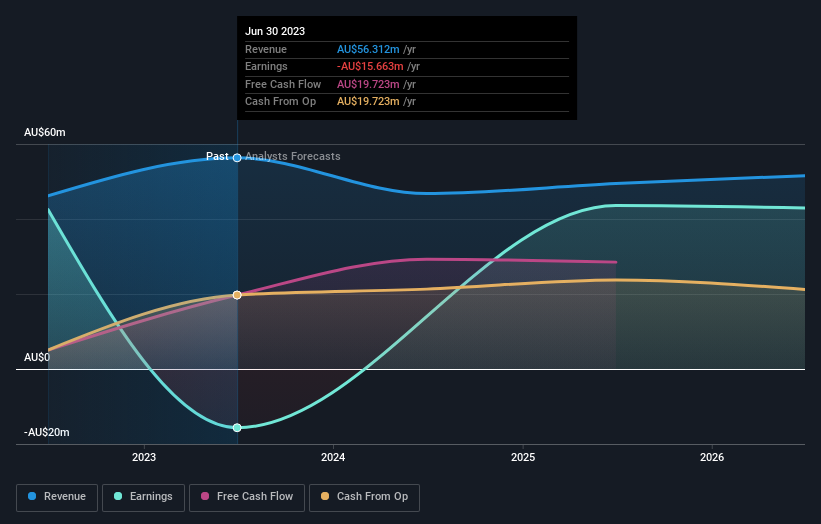While institutions own 44% of RAM Essential Services Property Fund (ASX:REP), individual investors are its largest shareholders with 53% ownership
Key Insights
The considerable ownership by individual investors in RAM Essential Services Property Fund indicates that they collectively have a greater say in management and business strategy
47% of the business is held by the top 25 shareholders
Recent purchases by insiders
If you want to know who really controls RAM Essential Services Property Fund (ASX:REP), then you'll have to look at the makeup of its share registry. And the group that holds the biggest piece of the pie are individual investors with 53% ownership. Put another way, the group faces the maximum upside potential (or downside risk).
And institutions on the other hand have a 44% ownership in the company. Institutions often own shares in more established companies, while it's not unusual to see insiders own a fair bit of smaller companies.
Let's take a closer look to see what the different types of shareholders can tell us about RAM Essential Services Property Fund.
See our latest analysis for RAM Essential Services Property Fund

What Does The Institutional Ownership Tell Us About RAM Essential Services Property Fund?
Institutions typically measure themselves against a benchmark when reporting to their own investors, so they often become more enthusiastic about a stock once it's included in a major index. We would expect most companies to have some institutions on the register, especially if they are growing.
RAM Essential Services Property Fund already has institutions on the share registry. Indeed, they own a respectable stake in the company. This implies the analysts working for those institutions have looked at the stock and they like it. But just like anyone else, they could be wrong. If multiple institutions change their view on a stock at the same time, you could see the share price drop fast. It's therefore worth looking at RAM Essential Services Property Fund's earnings history below. Of course, the future is what really matters.

RAM Essential Services Property Fund is not owned by hedge funds. Our data shows that Real Asset Management Group is the largest shareholder with 30% of shares outstanding. Meanwhile, the second and third largest shareholders, hold 4.5% and 4.5%, of the shares outstanding, respectively. Additionally, the company's CEO Scott Wehl directly holds 2.1% of the total shares outstanding.
Our studies suggest that the top 25 shareholders collectively control less than half of the company's shares, meaning that the company's shares are widely disseminated and there is no dominant shareholder.
While it makes sense to study institutional ownership data for a company, it also makes sense to study analyst sentiments to know which way the wind is blowing. There is some analyst coverage of the stock, but it could still become more well known, with time.
Insider Ownership Of RAM Essential Services Property Fund
While the precise definition of an insider can be subjective, almost everyone considers board members to be insiders. The company management answer to the board and the latter should represent the interests of shareholders. Notably, sometimes top-level managers are on the board themselves.
Insider ownership is positive when it signals leadership are thinking like the true owners of the company. However, high insider ownership can also give immense power to a small group within the company. This can be negative in some circumstances.
We can report that insiders do own shares in RAM Essential Services Property Fund. It has a market capitalization of just AU$367m, and insiders have AU$8.0m worth of shares, in their own names. It is good to see some investment by insiders, but it might be worth checking if those insiders have been buying.
General Public Ownership
The general public -- including retail investors -- own 53% of RAM Essential Services Property Fund. This size of ownership gives investors from the general public some collective power. They can and probably do influence decisions on executive compensation, dividend policies and proposed business acquisitions.
Next Steps:
I find it very interesting to look at who exactly owns a company. But to truly gain insight, we need to consider other information, too. For instance, we've identified 2 warning signs for RAM Essential Services Property Fund that you should be aware of.
If you are like me, you may want to think about whether this company will grow or shrink. Luckily, you can check this free report showing analyst forecasts for its future.
NB: Figures in this article are calculated using data from the last twelve months, which refer to the 12-month period ending on the last date of the month the financial statement is dated. This may not be consistent with full year annual report figures.
Have feedback on this article? Concerned about the content? Get in touch with us directly. Alternatively, email editorial-team (at) simplywallst.com.
This article by Simply Wall St is general in nature. We provide commentary based on historical data and analyst forecasts only using an unbiased methodology and our articles are not intended to be financial advice. It does not constitute a recommendation to buy or sell any stock, and does not take account of your objectives, or your financial situation. We aim to bring you long-term focused analysis driven by fundamental data. Note that our analysis may not factor in the latest price-sensitive company announcements or qualitative material. Simply Wall St has no position in any stocks mentioned.

 Yahoo Finance
Yahoo Finance 